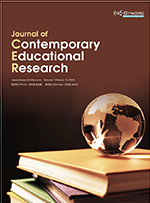Abstract
The teaching abilities of bilingual teachers have emerged as one of the major bottlenecks hindering the further development of Chinese-foreign cooperative education projects. Implementing the JiTT (Just-in-Time Teaching) model in bilingual courses of Chinese-foreign cooperative education can effectively integrate information technology with traditional classroom teaching. This integration enhances teaching quality and effectiveness, encourages university instructors to improve their diverse and collective capabilities, promotes digital development, and contributes to the enhancement of students’ learning abilities and overall improvement.
References
Mifsud L, Mørch AI, Lieberg S, 2012, An Analysis of Teacher-Defined Activities with Mobile Technologies: Predecessor and Successor Tool Use in the Classroom. Learning, Media and Technology, 38(1): 41–56, http://doi.org/10.1080/17439884.2012.655746
Riskowski JL, 2015, Teaching Undergraduate Biomechanics with Just-in-Time Teaching. Sports Biomechanics, 14(2): 168–179, http://doi.org/10.1080/14763141.2015.1030686
Gaddy VT, Medlock AE, 2013, Just-in-Time Teaching (JiTT): An Active Learning Pedagogy to Study Concepts in Cell Biology. Medical Science Educator, 23(4): 664–665. http://doi.org/10.1007/BF03341698
McGee M, Stokes L, Nadolsky P, 2016, Just-in-Time Teaching in Statistics Classrooms. Journal of Statistics Education, 24(1): 16–26. http://doi.org/10.1080/10691898.2016.1158023
Miranda DA, Lizcano-Dallos AR, Pinzón EF, 2023, Improving the Physics Learning Outcomes of Engineering Students Through Just in Time Teaching (JiTT). IEEE Revista Iberoamericana de Tecnologias del Aprendizaje, 18(2): 190–197. http://doi.org/10.1109/RITA.2023.3264446
